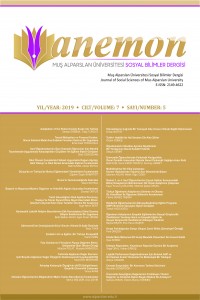Abstract
Bu çalışmada İşrâkî felsefenin kurucusu ve en önemli filozofu olan
Şihâbuddîn Sühreverdî’nin (ö. 1191) felsefî sisteminde merkezi bir konumda yer
alan Nûru’l-Envâr kavramı ontolojik çerçeve bağlamında incelenmiştir. Ona göre
varlık hiyerarşisinin en tepesinde Nûru’l-Envâr bulunmaktadır. Onun varlığı kendiliğinden
apaçık olduğu gibi aynı zamanda kendisi dışındaki bütün diğer varlıkları da
apaçık kılmaktadır. O, nurların nurudur; daima var olan ve mutlak olarak tek
olan nurdur. O, zatı gereği feyyaz olduğu için bütün varlıklar ondan feyezan
etmiştir. Onun varlığı zatı gereği zorunlu iken, diğer varlıklar zatları gereği
mümkün, yani eksik olan varlıklardırlar. Ayrıca onun ontolojik sisteminde
varlık, nur/ışık şeklinde nitelendirilirken yokluk ise zulmet, yani karanlık
olarak nitelendirilmektedir ki zulmet, mutlak kötülük anlamına gelmektedir.
Keywords
References
- Alıcı, M. (2014). Sühreverdî’nin İşrâk Felsefesi ve Kadîm İran Dinleri (Hikmetu’l İşrâk Özelinde), (Editör: M. N. Doru, K. Gökdağ, Y. Kaplan). Sühreverdî ve İşrâk Felsefesi içinde (ss. 43-84), Ankara: Otto Yayınları.
- Arslan, İ. (2015). Nurun Işımaları, Sıcaklığın Değişimleri: İşraki Hareket Kavramı, Dîvân: Disiplinlerarası Çalışmalar Dergisi, 39, 1-22.
- Bekiryazıcı, E. (2015). İşrakîlik ve Sühreverdî’nin İşrâk Felsefesinin Kaynakları, (Editör: E. Bekiryazıcı). Doğu’dan Batı’ya Düşüncenin Serüveni: Endülüs ve Felsefenin İşrakili(leşmesi)ği içinde (ss. 935-974), İstanbul: İnsan Yayınları.
- Cihan, A. K. (2015). Sühreverdî’nin Nur ve İnsan Düşüncesi, (Editör: E. Bekiryazıcı). Doğu’dan Batı’ya Düşüncenin Serüveni: Endülüs ve Felsefenin İşrakili(leşmesi)ği içinde (ss. 975-990). İstanbul: İnsan Yayınları.
- Cihan, A. K. (2014). Sühreverdî ve İşrâkilik, (Editör.: M. Cüneyt Kaya). İslâm Felsefesi: Tarih ve Problemler içinde (s. 397-4289). İstanbul: İsam Yayınları.Corbin, H. (2013). İslâm Felsefesi Tarihi: Başlangıcından İbn Rüşd’ün Ölümüne (1. Cilt), (Çeviren: Hüseyin Hatemî), İstanbul: İletişim Yayınları.
- Kaya, M. (2001). İşrâkıyye, Diyanet Vakfı İslam Ansiklopedisi (s. 435-438), İstanbul: Türkiye Diyanet Vakfı.
- Sühreverdî. (2012). İşrâk Felsefesi (Çeviren: Tahir Uluç), İstanbul: İz Yayıncılık.
- Türker, Ö. (2014). İşrâkîlik Yeni Bir Metafizik Midir?, (Editör: M. N. Doru, K. Gökdağ, Y. Kaplan). Sühreverdî ve İşrâk Felsefesi içinde (ss. 107-113), Ankara: Otto Yayınları.
- Uluç, Tahir. (2014). Sühreverdî’nin İbn Sînâ Eleştirisi, İstanbul: İnsan Yayınları.
- Uluç, T. (2014). Tanrı’nın Bilgisi Konusunda Sühreverdî’nin İbn Sînâ’ya Eleştirileri (Editör: M. N. Doru, K. Gökdağ, Y. Kaplan). Sühreverdî ve İşrâk Felsefesi içinde (ss. 115-135), Ankara: Otto Yayınları.
- Walbridge, J. (2008). Sühreverdî ve İşrakîlik, İslam Felsefesine Giriş içinde (ss. 221-246), (Editör: P. Adamson, R. C. Taylor), (Çeviren: M. C. Kaya), İstanbul: Küre Yayınları.
- Corbin, H. (2013). İslâm Felsefesi Tarihi: Başlangıcından İbn Rüşd’ün Ölümüne (1. Cilt), (Çeviren: Hüseyin Hatemî), İstanbul: İletişim Yayınları.
Abstract
In this study, the concept of Nur al-Anwar which is
in the central position of the philosophical system of Suhrawardi (d. 1191),
the founder and the most important philosopher of the Isrākī philosophy, has
been examined in the context of the ontological framework. According to him,
Nuru'l-Anwâr is the top element of the hierarchy of existence. His existence is
self-evident and at the same time it makes other beings obvious. He is the
light of light; always present and absolutely unique. All beings have
overflowed from him as a result of knowing his own self. In other words, while
he is self-evident and self-existing, every being, except him, are in need of
him to gain existence. So in their essence they can neither gain existence nor
have the will to maintain it. Hence, while he is Necessary Being due to his
self, other beings are possible beings or deficient beings. In addition, in his
ontological system, existence is characterized as light/divine light, while
non-existence is defined as oppression, or darkness, which means absolute evil.
References
- Alıcı, M. (2014). Sühreverdî’nin İşrâk Felsefesi ve Kadîm İran Dinleri (Hikmetu’l İşrâk Özelinde), (Editör: M. N. Doru, K. Gökdağ, Y. Kaplan). Sühreverdî ve İşrâk Felsefesi içinde (ss. 43-84), Ankara: Otto Yayınları.
- Arslan, İ. (2015). Nurun Işımaları, Sıcaklığın Değişimleri: İşraki Hareket Kavramı, Dîvân: Disiplinlerarası Çalışmalar Dergisi, 39, 1-22.
- Bekiryazıcı, E. (2015). İşrakîlik ve Sühreverdî’nin İşrâk Felsefesinin Kaynakları, (Editör: E. Bekiryazıcı). Doğu’dan Batı’ya Düşüncenin Serüveni: Endülüs ve Felsefenin İşrakili(leşmesi)ği içinde (ss. 935-974), İstanbul: İnsan Yayınları.
- Cihan, A. K. (2015). Sühreverdî’nin Nur ve İnsan Düşüncesi, (Editör: E. Bekiryazıcı). Doğu’dan Batı’ya Düşüncenin Serüveni: Endülüs ve Felsefenin İşrakili(leşmesi)ği içinde (ss. 975-990). İstanbul: İnsan Yayınları.
- Cihan, A. K. (2014). Sühreverdî ve İşrâkilik, (Editör.: M. Cüneyt Kaya). İslâm Felsefesi: Tarih ve Problemler içinde (s. 397-4289). İstanbul: İsam Yayınları.Corbin, H. (2013). İslâm Felsefesi Tarihi: Başlangıcından İbn Rüşd’ün Ölümüne (1. Cilt), (Çeviren: Hüseyin Hatemî), İstanbul: İletişim Yayınları.
- Kaya, M. (2001). İşrâkıyye, Diyanet Vakfı İslam Ansiklopedisi (s. 435-438), İstanbul: Türkiye Diyanet Vakfı.
- Sühreverdî. (2012). İşrâk Felsefesi (Çeviren: Tahir Uluç), İstanbul: İz Yayıncılık.
- Türker, Ö. (2014). İşrâkîlik Yeni Bir Metafizik Midir?, (Editör: M. N. Doru, K. Gökdağ, Y. Kaplan). Sühreverdî ve İşrâk Felsefesi içinde (ss. 107-113), Ankara: Otto Yayınları.
- Uluç, Tahir. (2014). Sühreverdî’nin İbn Sînâ Eleştirisi, İstanbul: İnsan Yayınları.
- Uluç, T. (2014). Tanrı’nın Bilgisi Konusunda Sühreverdî’nin İbn Sînâ’ya Eleştirileri (Editör: M. N. Doru, K. Gökdağ, Y. Kaplan). Sühreverdî ve İşrâk Felsefesi içinde (ss. 115-135), Ankara: Otto Yayınları.
- Walbridge, J. (2008). Sühreverdî ve İşrakîlik, İslam Felsefesine Giriş içinde (ss. 221-246), (Editör: P. Adamson, R. C. Taylor), (Çeviren: M. C. Kaya), İstanbul: Küre Yayınları.
- Corbin, H. (2013). İslâm Felsefesi Tarihi: Başlangıcından İbn Rüşd’ün Ölümüne (1. Cilt), (Çeviren: Hüseyin Hatemî), İstanbul: İletişim Yayınları.
Details
| Primary Language | Turkish |
|---|---|
| Journal Section | Research Article |
| Authors | |
| Publication Date | October 7, 2019 |
| Acceptance Date | March 5, 2019 |
| Published in Issue | Year 2019 Volume: 7 Issue: 5 |

